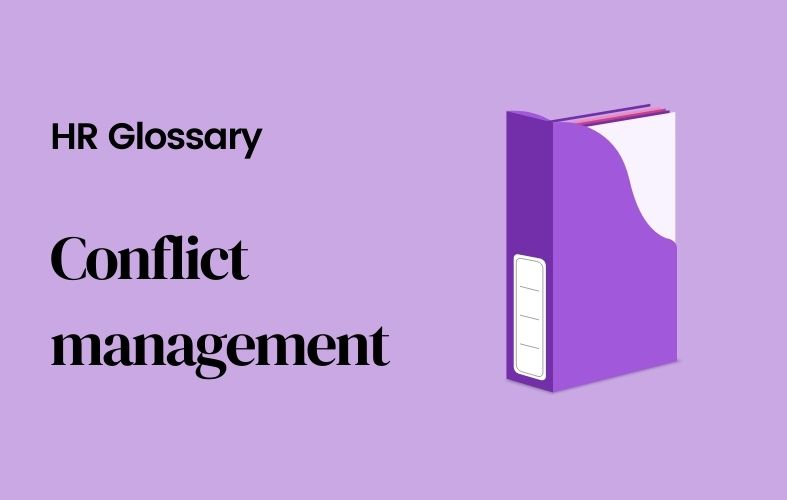Conflict management

[Sommaire]
What is conflict management?
Conflict management also referred to as conflict resolution, refers to a disagreement or argument that arises from within the workforce that is resolved by management. This is achieved by implementing a series of well-established intervention techniques, often as part of employee relations.
What are conflict management skills?
Effective conflict resolution style skills are those abilities that allow you to deal with disagreements or arguments constructively and positively. They can help you resolve conflicts at work, home, or any other area of your life.
Some skills to manage conflicts include:
- Active listening
- Mediation
- Negotiation
- Problem-solving
- Conflict resolution
What are the benefits of conflict management?
Kenneth Kaye once stated, “Conflict is neither good nor bad. Properly managed, it is absolutely vital.” This quote highlights just how crucial quality conflict management is. If done correctly, it can increase workforce productivity, raise morale, and decrease the company's employee turnover rate.
Well-controlled conflict is an integral part of the workplace. This is because it breeds assertiveness amongst workers. However, conflicts that are not addressed can worsen, leading to poor communication and ultimately producing a disengaged and disenfranchised workforce.
Conflict management is a vital part of leadership
If you are in a leadership role, you are expected to deal with conflict head-on. This can generate trust and confidence. Therefore, an incapacity to handle and manage conflict resolution is an incapacity to lead.
What is more, you can organize conflict management training for your employees from time to make sure that they know how to handle conflict when it comes up.
What are the types of conflict management?
There are five conflict management styles. These are:
1. Accommodating:
This style has elements of altruism to it. For example, unselfishness and self-sacrifice. It is when you accommodate and cooperate with another person’s viewpoint to keep the peace. This style can be adopted when using empathy in a given situation.
2. Competing:
The exact opposite of the accommodating style, with elements of egotism to it. For example, selfishness and thinking you are right. It involves sticking to your argument until you win it. This can be employed when a decision is needed to be made quickly.
3. Avoiding:
This describes a process where a person quite simply withdraws from the conflict. For instance, they might be too busy at the time to want to get involved in a dispute. Another possible explanation could be that they have not had time to form an opinion yet.
4. Compromising:
Here, the individual takes the middle ground position regarding a disagreement. It all involves all parties willing to find a moderate solution to the problem at hand. This contrasts with the competing style, which is all about winning the argument.
5. Collaborating:
This style goes further than a mediator attempting to find the middle ground. They go one step further to ensure that everybody is happy with the solution.
What are the best practices for conflict management?
For a properly managed conflict, there are some best practices that should be adhered to. These are:
Emotional Intelligence:
This involves remaining calm in an argument when others may not be, thus promoting greater rationality.
Listening:
For good communication skills, one of the first skills to employ when trying to sort out a conflict is to listen to all sides properly. This is instead of prioritizing a reply straight away.
Empathy:
The ability to put yourself in someone else’s position. This skill lends itself to solution solving rather than argument winning.
Humor:
Using humor can diffuse any heightened tension that may arise, therefore making resolving conflict more likely.
Pick on the position, not the person:
Be careful not to make it personal by attacking the aggrieved person rather than the subject.
Conflict management styles quiz
1) You have been asked to participate in a project at work that you disagree with. What is the best way to handle this situation?
A) I will refuse to participate in the project and let all parties involved know my opinion.
B) I will go along with the project but voice my concerns to my manager.
C) I will participate in the project but keep my opinions to myself.
2) One of your team members has been consistently arriving late for work. How do you deal with this?
A) I will speak to them privately and try to understand the reasons for their lateness.
B) I will speak to them in front of the whole team and tell them that their lateness is unacceptable.
C) I will ignore the situation and hope that it improves on its own.
3) A client has made a complaint about the service they received from your company. How do you deal with this?
A) I will speak to the client privately and try to resolve the issue.
B) I will pass the complaint on to my manager and let them deal with it.
C) I will speak to the client in a public forum and try to resolve the issue.
4) You have been asked to work on a project with a colleague with whom you do not get along. How do you deal with this?
A) I will try to find a way to avoid working with them.
B) I will speak to my manager and ask to be assigned to another project.
C) I will work with them and try to resolve our differences.
5) One of your team members has constantly been disrupting meetings and interrupting others. How do you deal with this?
A) I will speak to them privately and try to understand the reasons for their behavior.
B) I will speak to them in front of the whole team and tell them that their behavior is unacceptable.
C) I will ignore the situation and hope that it improves on its own.
6) You have been asked to take on a project outside your area of expertise. How do you deal with this?
A) I will speak to my manager and ask to be reassigned to another project.
B) I will take on the project and try to learn as much as possible.
C) I will refuse to take on the project and make my opinion known to my colleagues.
7) A client has made a demand that you know is unrealistic. How do you deal with this?
A) I will speak to the client privately and try to resolve the issue.
B) I will pass the complaint on to my manager and let them deal with it.
C) I will speak to the client in a public forum and try to resolve the issue.
If you have answers with A or B, your conflict resolution tactic is aggressive.
If you have answers with C, your conflict management style is passive.
If you have answers with A and C, your conflict management style is competitive.
If you have answers with B and C, your conflict management style is collaborative.
If you have answers with A, B, and C, your workplace conflict management style is accommodative.


